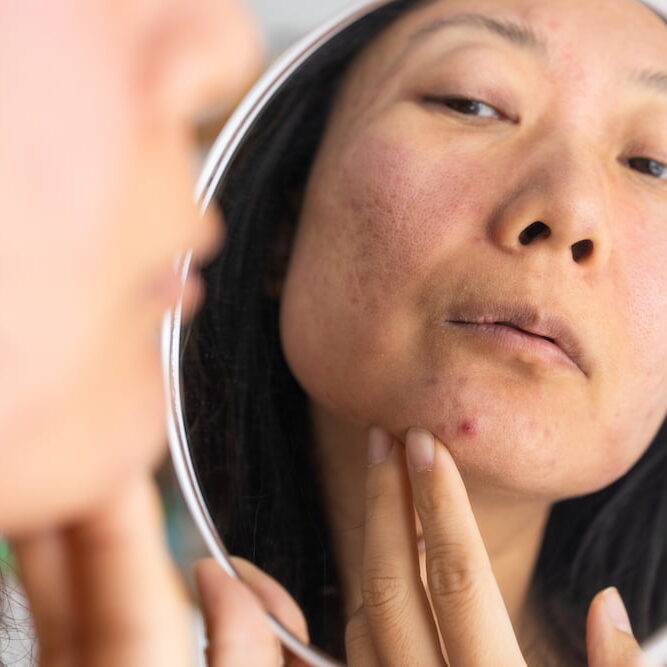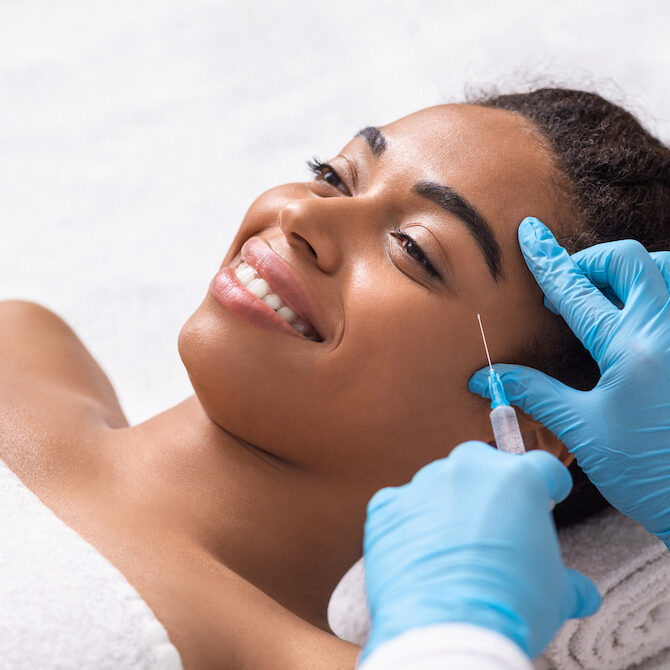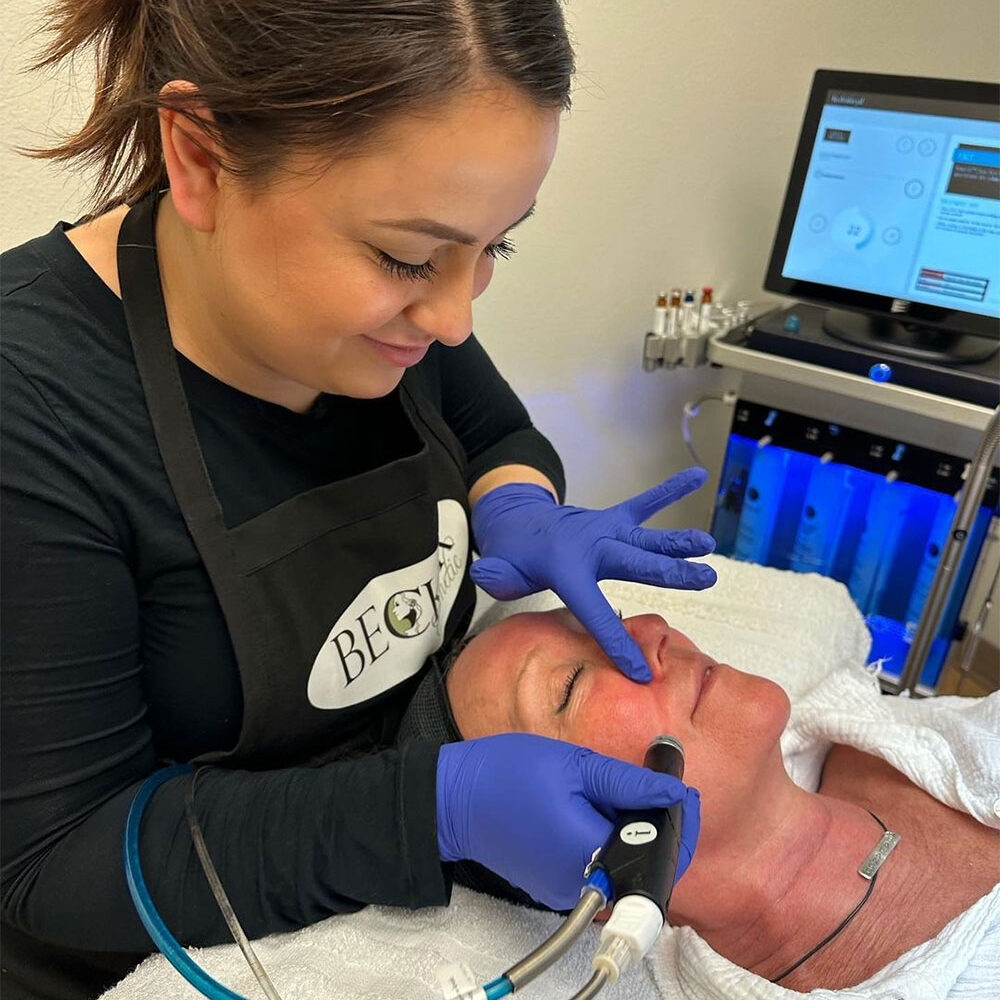Understanding Your Acne: Tips for Recognizing Different Types

Acne can be a frustrating and persistent problem, affecting individuals of all ages. While it’s often associated with teenagers, acne can continue to impact adults, causing distress and a blow to self-esteem.
The key to clearer skin lies in understanding the different types of acne and how to treat them effectively. Let’s jump into the world of acne, uncover its secrets, and explore professional cosmetic treatments offered by our master estheticians at Becker Cosmetic.
Key Takeaways
- Comprehensive Understanding: Recognizing and understanding the different types of acne is essential for effective treatment.
- Contributing Factors: Hormonal changes, stress, diet, skincare habits, and the presence of p. acne bacteria all play significant roles in the development of acne.
- Professional Acne Treatments: Identifying the specific type and cause of acne is crucial for choosing the appropriate treatment.
- Customized Solutions: In addition to at-home skin care, treatments like Forever Clear BBL®, HydraFacial®, The Perfect Derma™ Peel, and BioRePeel effectively address active acne.
- Scar Treatments: Microneedling with RF, regular Microneedling, and the Plasma Pen are effective solutions for various types of acne scarring.
- Preventative Measures: Maintaining a consistent skincare routine, making lifestyle changes, and seeking regular professional advice are crucial to preventing acne and maintaining healthy skin.
Uncovering the Causes
Acne is a common skin condition that occurs when hair follicles become clogged with oil and dead skin cells. This blockage can lead to various breakouts, from pimples and blackheads to more severe types like cysts and nodules. Understanding the causes of acne can help manage and prevent it effectively.
- Hormonal Changes: Hormonal fluctuations, especially during puberty, pregnancy, and menstruation, can increase oil production, leading to clogged pores.
- Stress: Can trigger or worsen acne by increasing the production of cortisol, which in turn increases oil production in the skin.
- Diet: High-glycemic foods and dairy products might contribute to acne by causing insulin spikes that increase oil production.
- Skincare Habits: Using products that clog pores or not cleansing properly can lead to acne. It’s important to choose non-comedogenic products and maintain a consistent skincare routine.
Recognizing the Types
Identifying what type of acne you’re dealing with is the first step towards clearer skin. While over-the-counter treatments might work for non-inflammatory types like whiteheads and blackheads, more severe forms like nodules and cysts often need professional intervention.
Non-Inflammatory Acne
- Whiteheads: These are small, flesh-colored, or white bumps that remain under the skin and are not inflamed. They occur when hair follicles are clogged with oil and dead skin cells.
- Blackheads: These are open, clogged pores that turn black due to oxidation, not dirt. The reaction of sebum with air causes a dark color.
Inflammatory Acne
- Papules: These are small, red, tender bumps without pus. They are inflamed and can be sensitive to touch.
- Pustules: Often known as the classic “zits,” these are pimples with pus at the tip, usually red at the base, and are inflamed.
Severe Acne
- Nodules: These are large, painful lumps deep within the skin. They are more severe and can cause significant discomfort.
- Cysts: These are painful, pus-filled lumps under the skin’s surface that can lead to scarring if not treated properly.
Each type of acne has distinct characteristics and requires a different approach to treatment. If you’re unsure what kind of acne you have, consult a professional.
How to Effectively Prevent Acne
Preventing acne is just as crucial as treating it. A consistent at-home skincare regimen tailored to your skin type is essential for maintaining clear skin. Using gentle cleansers, non-comedogenic moisturizers, and regular exfoliation can help keep your pores clear and prevent breakouts.
Additionally, routine treatments with a master esthetician provide professional-level care and guidance, addressing any underlying issues and adjusting your skincare plan as needed. Combining daily at-home care with regular professional treatments ensures your skin stays healthy and resilient, reducing the likelihood of future acne flare-ups.
When to Seek Professional Help
It’s important to seek professional help when dealing with persistent acne that doesn’t improve with over-the-counter treatments. Severe acne, especially nodules or cysts, can cause significant pain and lead to scarring, requiring specialized care.
If acne causes emotional distress or impacts your quality of life, consulting a professional is crucial. At Becker Cosmetic, our master estheticians can provide a thorough skin assessment and recommend a tailored treatment plan to address your specific needs.
Professional intervention ensures that you receive the most effective treatments, reducing both the physical and emotional burdens of acne.
Medspa Treatments for Acne Management
Active acne can be persistent and painful, often requiring targeted treatment. Depending on your skin type and the type of acne, treatments may vary. Here are some professional treatment options that can provide more significant and lasting results:
- Deep Acne Treatment: Forever Clear BBL® uses broadband light to penetrate deep within the skin, targeting bacteria and reducing inflammation, which helps reduce the severity and frequency of breakouts.
- Comprehensive Skin Cleansing: The HydraFacial® treatment provides a multi-step facial that cleanses, exfoliates, and hydrates the skin, removing impurities and dead skin cells to enhance skin clarity and health.
- Chemical Exfoliation: The Perfect Derma™ Peel offers a chemical exfoliation to clear acne and improve skin texture and tone by promoting cell turnover. The acids, including salicylic acid, clean deep within the pores, dissolving oil and debris that contribute to clogged pores and acne.
Effective Solutions for Acne Scarring
Acne scarring refers to the marks left behind after the acne has healed. These scars can range from mild to severe and affect the skin’s smoothness and appearance.
- Surface-Level Scarring: HydraFacial® is an effective treatment for surface-level scarring, as it exfoliates, hydrates, and improves the overall texture and tone of the skin. Microneedling also works well for minor scars by creating micro-injuries that promote collagen production.
- Moderate Scarring: Microneedling is highly effective for moderate scarring. This treatment creates controlled micro-injuries in the skin, stimulating collagen production and improving the appearance of mild to moderate scars.
Severe Scarring: For more severe scarring, Microneedling with Radio Frequency (RF) combines microneedling with RF energy to stimulate deeper collagen production and repair deep scars. The Plasma Pen further enhances skin tightening and reduces the appearance of severe scars and fine lines.
These professional treatments are designed to address both active acne and acne scarring, providing comprehensive solutions for clearer, healthier skin.
Frequently Asked Questions
What causes acne?
Acne is caused by a combination of factors, including hormonal changes, increased oil production, clogged pores, P. acne bacteria, and inflammation. External factors like stress, diet, and skincare habits can also influence acne.
How can I tell what type of acne I have?
Determining the type of acne you have is best done by a professional. During a consultation, our master estheticians can assess your skin and provide an accurate diagnosis. This will ensure you receive the most effective treatment tailored to your specific needs rather than attempting to self-diagnose at home.
Are professional treatments better than over-the-counter solutions?
Professional acne treatments are often more effective for persistent and severe acne because they target deeper skin layers and address the root causes of acne. They also use higher-quality ingredients and stronger formulations, leading to better results compared to over-the-counter solutions, which may only be sufficient for mild cases.
How often should I visit a master esthetician for acne treatment?
Regular visits to a master esthetician, such as once a month, can help maintain clear skin and prevent severe breakouts. Consistent professional assessments and treatments can adapt to your skin’s changing needs and ensure optimal results.
Can lifestyle changes really help prevent acne?
Yes, lifestyle changes can significantly impact your skin’s health. Maintaining a balanced diet, staying hydrated, managing stress, and following a consistent skincare routine can help prevent acne and improve overall skin condition. Regular exercise and adequate sleep also contribute to healthier skin.
Final Thoughts
Understanding your acne is the first step towards achieving clearer skin. By identifying the type of acne you have and choosing the right treatment, you can effectively manage and reduce breakouts.For personalized and professional skincare solutions, our master estheticians at Becker Cosmetic are here to help you every step of the way. Taking care of your skin is a journey, and with the right medical spa support and guidance, you can achieve the healthy, clear complexion you’ve always wanted.
Related Blog Posts

The Becker Cosmetic blog highlights the newest treatments available, skincare tips and tricks, and anti-aging insider secrets.
Sign-up to get updates and exclusive specials delivered to your inbox.




